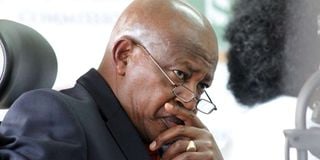Breaking: Autopsy reveals how Cyrus Jirongo died
Premium
Why Kenya won't cooperate with ICC in Paul Gicheru’s case

Attorney General Kihara Kariuki. Dennis Onsongo | Nation Media Group
What you need to know:
- Mr Gicheru surrendered to the ICC on November 2, after nearly five years as a fugitive.
- Attorney General hinted that the government was not aware of the lawyer’s intention to surrender to ICC.
Lawyer Paul Gicheru’s hopes of securing a conditional release from the International Criminal (ICC) Court’s detention looks to have diminished after Kenya said it will not cooperate with The Hague court on the matter.
In a letter to the presiding judge Reine Adélaïde Sophie Alapini-Gansou, Attorney General Kihara Kariuki told the court that Mr Gicheru went against “a binding decision” of the High Court of November 16, 2017 that had frozen the ICC’s arrest warrants against the lawyer and his co-accused Phillip Bett on allegations of witness tampering.
Moreover, the Attorney General says that Mr Gicheru has not complied with the International Crimes Act that required him to notify the High Court in Nairobi before he surrendered to the ICC.
The Act domesticated the Rome Statute that establishes the ICC.
“In view of the foregoing, and by dint of the existing High Court order as mentioned hereinabove, Kenya observes that it may not, at this point in time, be able to accord the court the assistance contemplated in Rule 119(1) of the Court’s Rules of Procedure and Evidence, unless the said order is lifted or otherwise varied,” the Attorney General states in the letter dated November 24.
However, the AG says that there is still a chance for Mr Gicheru to notify the High Court so that the freeze on the arrest warrant could be varied or lifted, which would make the government review its current position.
The Attorney General’s letter was in response to an order issued by the ICC’s Pre-Trial Chamber A’s order of November 12 for Kenya to submit its views on Mr Gicheru’s request to return to the country.
The Kingdom the Netherlands which had also been asked to submit its views has told the court that it is ready to facilitate Mr Gicheru’s transfer from the detention centre where he is being held to the airport and also receive him at the airport and transfer him back to the court when attending his trial.
Before granting Mr Gicheru’s request for interim release the court wanted the government to give certain undertakings “to enforce one or more conditions restricting liberty the Chamber could potentially impose.”
Government undertakings
Those conditions include the requirement that Mr Gicheru will not be allowed to travel outside Kenya without the explicit agreement of the Chamber; that he must not go to certain places or associate with certain persons as specified by the Pre-Trial Chamber; that he must not contact directly or indirectly victims or witnesses; that he must not engage in certain professional activities; that he must reside at a particular address as specified by the Pre-Trial Chamber; and that he must respond when summoned by an authority or a qualified person designated by the Pre-Trial Chamber.
The prosecutor did not object to Mr Gicheru’s request for conditional release and the lawyer’s release all depended on what Kenya would tell the court as requested by the order of November 12.
The import of the AG’s letter is that Mr Gicheru may not be conditionally released and could remain in detention for the entire period of his trial unless another country agrees to accommodate him and comply with the ICC's conditions for interim release.
Mr Gicheru surrendered to the ICC on November 2, after nearly five years as a fugitive following his indictment for alleged witness tampering in the case against Deputy President William Ruto. His surrender caught many in Kenya and at the ICC off-guard.
Mr Kariuki hints as much that the government was not aware of the lawyer’s intention to surrender to the court when he asserts that Mr Gicheru did not notify the High Court of his surrender as required by the International Crimes Act.
Amid speculations of his motive for surrender, he has told the pre-trial chamber that he did it on his own volition.
“As to the condition so my surrender I wish to confirm to this court that I surrendered myself first to the Dutch authorities, then to the court. This surrender was without coercion or urging from anybody. I did it on my own volition and at my cost,” he said.
The ICC prosecutor accuses Mr Gicheru him of corruptly influencing six witnesses who were set to testify against Dr Ruto by paying bribes and drawing affidavits they used to recant their testimony to the ICC.
Following the collapse of the post-election violence cases at the ICC, President Uhuru Kenyatta in 2016 vowed that he would not allow another Kenyan to be tried by The Hague court.
Moreover, in the lead up to the collapse of the post-election violence cases, the ICC prosecutor Fatou Bensouda had had a fraught relationship with the government which she accused of failing to cooperate with her office as required of a state member.




